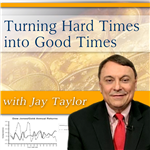Dr. Daniel Lacalle will visit for the first time and Edward Griffin, the author of the prophetic book, “The Creature from Jekyll Island,” will reappear from the replay of the March 24, 2009 episode which was the very first episode of Turning Hard Times into Good Times. Not only did Ed Griffin outline the reasons why he anticipated a decline in the standard of living for Americans but also his ultimate concern that unless we return to an honest monetary system, we Americans are destined to lose our personal freedoms and property rights under an emerging dictatorship. Enabling government to remove freedom and wealth from Americans is the Creature of Jekyll Island aka the Federal Reserve Bank. The American public was sold a bill of goods in 1913 when the Fed was created. We were told that the Fed would eliminate the business cycle which it did. But in its place, it created a credit cycle that has been far worse for average Americans than an old-fashioned business cycle because it has been used to siphon off wealth of the middle classes into the wallets of elite members of American society who enjoy close relations with the federal government. From his 2009 remarks, Ed has provided answers as to why the Fed was created, by whom and why it has been an unmitigated disaster to common Americans but a total success for America’s upper classes. With inflation on the rise and Americas national debt growing exponentially, some analysts fear higher interest rates could trigger a debt-related death spiral for the dollar. But Daniel believes that the Fed and other Central Banks will choose recession over inflation in order to preserve capital and presumably prolong the life of the dollar as the world’s reserve currency. We will ask him to explain why he thinks central banks will now choose the more difficult path of recession rather than to “kick the can down the road” as central banks have always done since gold was removed from the monetary system in in 1971. Given Daniel’s work as a fund manager, we may also ask him for some ideas about how we might protect ourselves from potential harm of a possible 2023 global recession.



